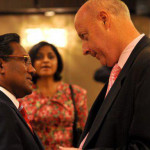The ministry of finance has asked parliament and the Maldives Monetary Authority (MMA) to arbitrate a dispute between the ministry and the Civil Service Commission (CSC) over the restoration of civil servants’ salaries.
Parliament has been asked to act as a mediator as the ministry “does not believe a satisfactory solution can be found through discussions with the commission”.
Until the dispute is resolved, “employees will receive the salary that was reduced due to the economic circumstances,” the finance ministry’s statement said.
The CSC meanwhile criticised the ministry for a lack of communication and unwillingness to meet for discussions.
“They could ask us to sit down and discuss this tomorrow morning and we would be there,” said CSC member Mohamed Fahmy Hassan.
“We’ve sent many letters and made many requests for them to submit information but they have not submitted it to us,” he said.
The CSC was not opposed to the involvement of third parties such as the MMA, he said, but having another government institution like the MMA acting as a go-between “sounds a bit odd.”
“We can discuss the issue with MMA or the People’s Majlis, but there’s going to be no decision made without the involvement of the finance ministry.”
Parliament broke for recess in December and will begin its first session of the year in March.
Waiting game
On 30 December, the CSC issued a circular announcing that civil servants’ salaries and allowances had been restored to their former levels.
Since it was agreed that the pay cuts will be rescinded once government revenue exceeds Rf7 billion, the CSC argued, the salaries would have been “automatically reversed” when parliament approved this year’s budget with a revenue of over Rf7 billion.
However the finance ministry’s statement criticised the commission for the announcement as it came after the ministry had declared that the economic circumstances had not changed.
“And while it did not consult with the ministry, the fact that the Civil Service Commission did not seek the advice and counsel of the Maldives Monetary Authority, the most appropriate independent institution to approach before making such a decision, is regrettable,” it said.
No deal
The pay cuts of up to 20 per cent for civil servants were made necessary due to a fall in government income and an increase in expenditure, the ministry claimed.
In August, the government introduced a raft of austerity measures – including cutting back on travel, controlling capital items purchases, halting renovation and repairs unless necessary and pay cuts of 20 per cent for political appointees ranked higher than deputy minister to alleviate the inherited budget deficit.
Recurrent expenditure on salaries and allowances for government employees was 34 per cent of total expenditure in 2008, a 62 per cent increase from the previous year.
The International Monetary Fund [IMF] has noted that this puts the Maldives in first place among small island nations for the highest expenditure on government employees as a percentage of GDP.
Pay cuts for civil servants were enforced in October following protracted negotiations with the CSC.
The commission exercised clause 43[c] of its Act, which authorise it to alter salaries based on “special economic circumstances” subject to a review in three months.
“The measure proposed by this ministry to determine the special circumstances was the state’s income and expenditure,” the ministry’s statement read. “It was therefore agreed that the economic circumstances would be considered to have passed once the state’s annual income exceeds Rf7 billion, while it was also agreed that the state’s total income does not include foreign aid once-off revenue.”
It further added that the pay cuts were not made for a three-month period, but would be subject to a review to determine if the economic circumstances had changed.
The inclusion of foreign aid in the government’s budget is a particular point of contention, as it pushes the total revenue over Rf7 billion. Actual government revenue excluding foreign aid and once-off revenue was projected to be Rf6.8 billion in the budget.
“We understood it was the total revenue of the government. The ministry’s press release on 25 September said they were not going to exclude anything. This issue needs to be resolved,” said Fahmy.
Special circumstances would be considered to have improved when the state’s “recurring income” reaches Rf7 billion, the ministry said, and “not when it is estimated that Rf7 billion will be received in income.”
Scaring off donors
The opposition-dominated committee selected to review the budget made a recommendation to inject Rf617 million to restore civil servants’ salaries as the proposed budget had Rf7.05 billion in revenue.
While the original budget submitted to parliament had a deficit of 14.8 per cent and was acceptable to the IMF, the alternations made by parliament increased it to 18.8 per cent.
The ministry now estimates the deficit by the end of the year will exceed 18.8 per cent as the government will lose Rf150 million in revenue due to parliament’s failure to pass taxation legislation.
Increasing expenditure at the beginning of the year based on projected revenue was “not sensible at all”, the ministry insisted.
There were four ways the government could plug the deficit – printing money, financial assistance from international monetary organizations, obtaining commercial loans and devaluing the rufiyaa – all of which would have adverse effects of the economy.
Printing money would lead to inflation and a dollar shortage, taking commercial loans would make it harder for the private sector to secure loans and devaluing the currency would increase inflation and the price of imports.
Instead, the ministry reached agreements with the IMF, World Bank and the Asian Development Bank to obtain loans to plug the deficit.
However hiking salaries for government employees without increasing the revenue base was not “a sustainable fiscal or monetary policy”, and these international organisations have since informed the government that they are reconsidering the loans, the ministry’s statement said.
If the Maldives does not have an economic framework that is acceptable to the IMF, it continues, it would not be possible to obtain assistance or loans from other financial institutions.
Apart from potentially losing Rf755 million in assistance from the World Bank and ADB, the donor forum organised by the World Bank and scheduled for March could be canceled.
“Therefore, the ministry believes reducing expenditure is the wisest and most economically sensible way,” it said, adding that expenditure on wages had to be kept low until the economy rebounds.
Fahmy said the CSC was willing to negotiate and wished to meet the finance ministry “to hear their views on the economic circumstances.”
“We have always said that if there is a national crisis we will put the national interest above the interest of civil servants,” he said.
“But it is difficult to justify that to 29,000 civil servants if the government is spending on all the other items in the budget.”






The Civil Service Commission and the Civil Service is overstaffed and inefficient. That is the first thing that needs to be addressed first.
Fahmy clearly doesnt know what he is talking about. MMA is not Gov and finance minister doesnt have to sleep with fahmy, the budget speaks for itself that the figure is a estimate.. idiotic fools from gayooms regime..